Research Proposal: CBT vs. Pharmacotherapy for Depression
VerifiedAdded on 2023/06/08
|10
|2627
|391
Report
AI Summary
This research proposal investigates the effectiveness of supplementary Cognitive Behavioral Therapy (CBT) compared to pharmacotherapy alone in treating depressive disorder. It addresses the controversies surrounding antidepressant efficacy and the challenges in treating depression, especially in the elderly, due to overlapping symptoms and age-related pharmacokinetic changes. The proposal reviews existing literature, highlighting gaps in research, such as the cost-effectiveness of CBT and its long-term efficacy. The proposed research method involves a randomized controlled trial to evaluate changes in depressive symptoms, relapse prevention, and barriers to treatment, utilizing the DSM-V criteria for participant selection and the Beck Depression Inventory II tool for outcome measurement. The study aims to determine if combining CBT with pharmacotherapy yields superior results compared to pharmacotherapy alone, while also considering factors that improve the delivery of CBT by mental health professionals. The data collected will focus on primary outcomes of decrease in depressive symptoms and secondary outcomes related to symptom relapse and barriers/facilitators to treatment, gathered through face-to-face interviews.
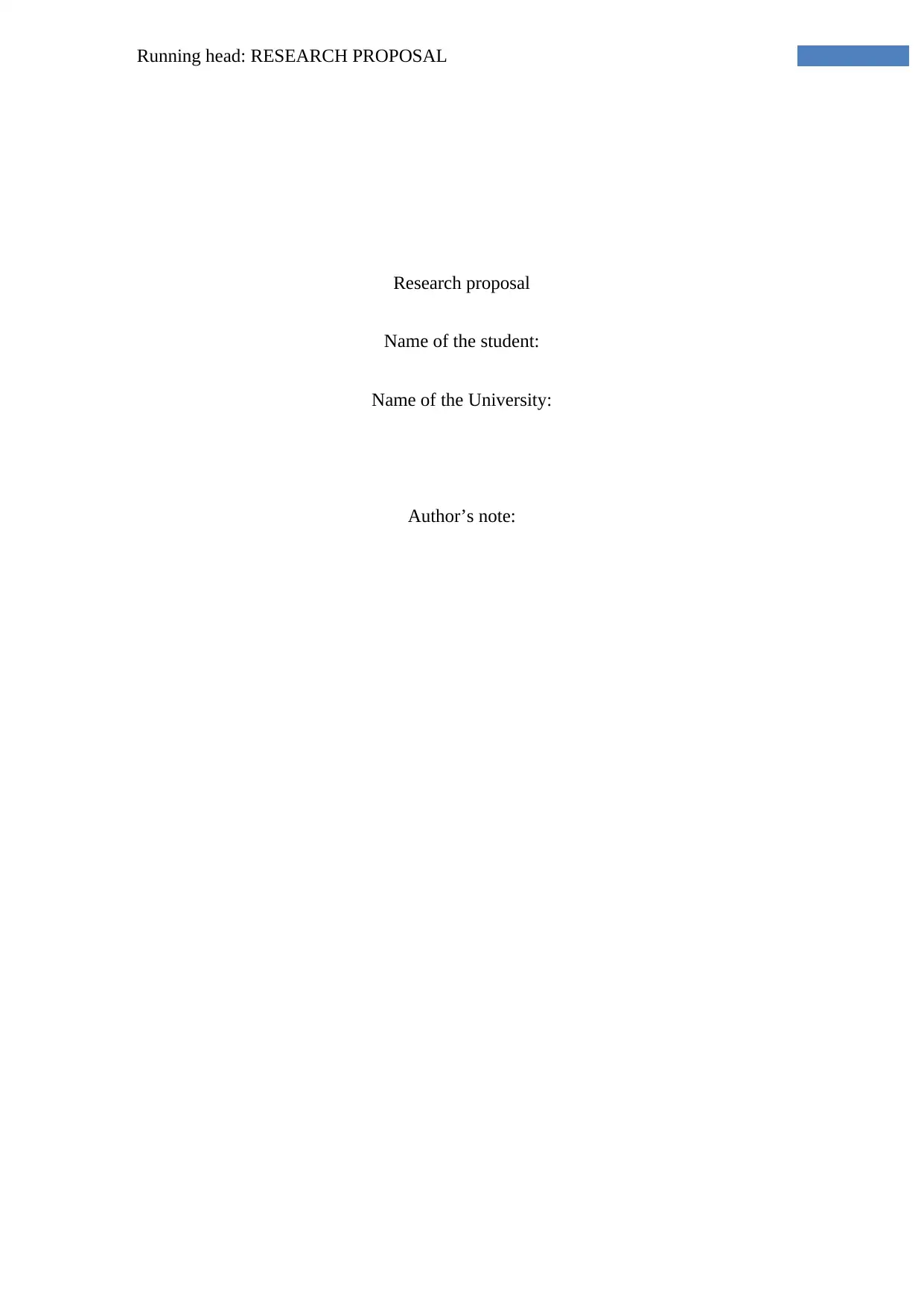
Running head: RESEARCH PROPOSAL
Research proposal
Name of the student:
Name of the University:
Author’s note:
Research proposal
Name of the student:
Name of the University:
Author’s note:
Paraphrase This Document
Need a fresh take? Get an instant paraphrase of this document with our AI Paraphraser
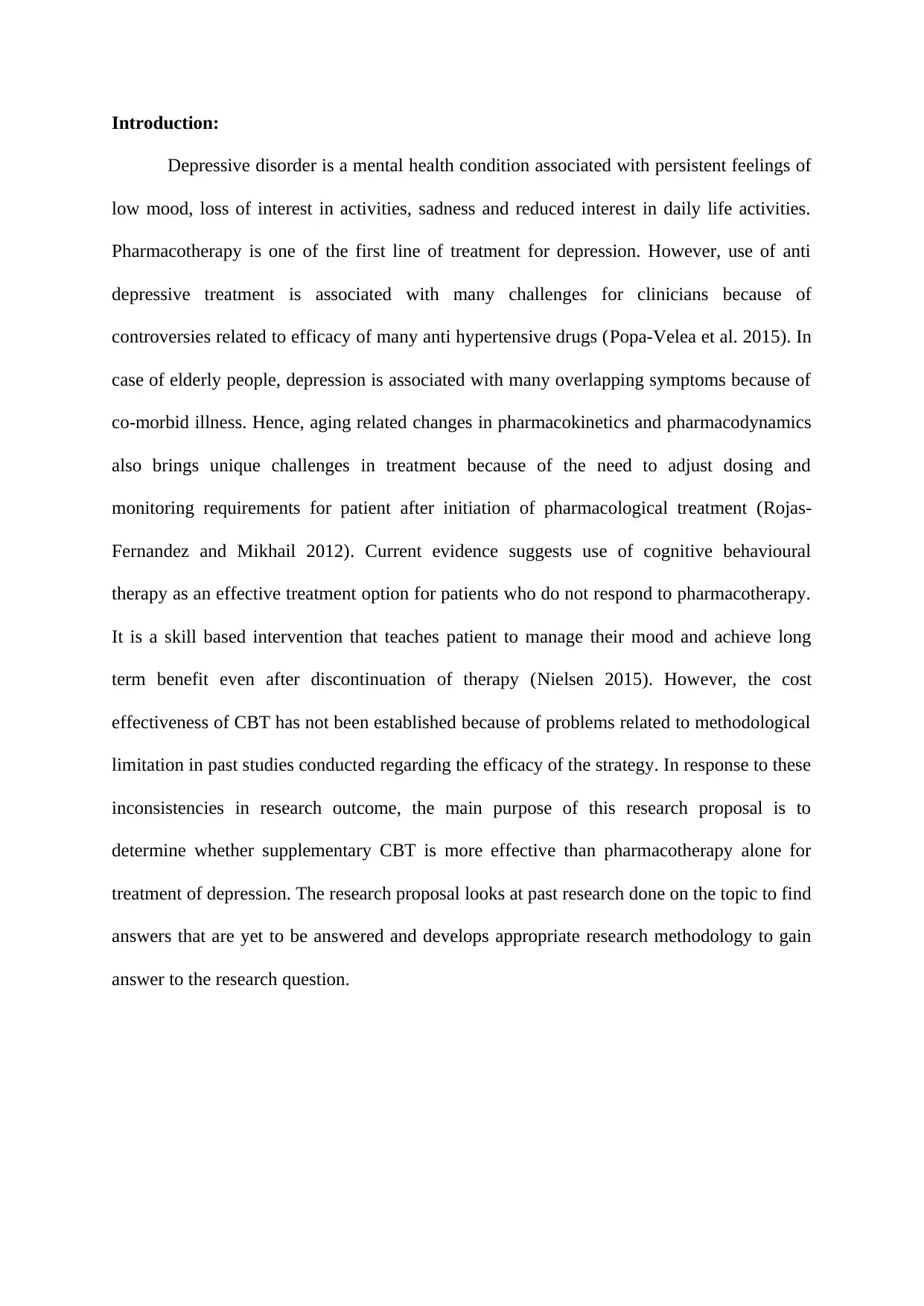
Introduction:
Depressive disorder is a mental health condition associated with persistent feelings of
low mood, loss of interest in activities, sadness and reduced interest in daily life activities.
Pharmacotherapy is one of the first line of treatment for depression. However, use of anti
depressive treatment is associated with many challenges for clinicians because of
controversies related to efficacy of many anti hypertensive drugs (Popa-Velea et al. 2015). In
case of elderly people, depression is associated with many overlapping symptoms because of
co-morbid illness. Hence, aging related changes in pharmacokinetics and pharmacodynamics
also brings unique challenges in treatment because of the need to adjust dosing and
monitoring requirements for patient after initiation of pharmacological treatment (Rojas-
Fernandez and Mikhail 2012). Current evidence suggests use of cognitive behavioural
therapy as an effective treatment option for patients who do not respond to pharmacotherapy.
It is a skill based intervention that teaches patient to manage their mood and achieve long
term benefit even after discontinuation of therapy (Nielsen 2015). However, the cost
effectiveness of CBT has not been established because of problems related to methodological
limitation in past studies conducted regarding the efficacy of the strategy. In response to these
inconsistencies in research outcome, the main purpose of this research proposal is to
determine whether supplementary CBT is more effective than pharmacotherapy alone for
treatment of depression. The research proposal looks at past research done on the topic to find
answers that are yet to be answered and develops appropriate research methodology to gain
answer to the research question.
Depressive disorder is a mental health condition associated with persistent feelings of
low mood, loss of interest in activities, sadness and reduced interest in daily life activities.
Pharmacotherapy is one of the first line of treatment for depression. However, use of anti
depressive treatment is associated with many challenges for clinicians because of
controversies related to efficacy of many anti hypertensive drugs (Popa-Velea et al. 2015). In
case of elderly people, depression is associated with many overlapping symptoms because of
co-morbid illness. Hence, aging related changes in pharmacokinetics and pharmacodynamics
also brings unique challenges in treatment because of the need to adjust dosing and
monitoring requirements for patient after initiation of pharmacological treatment (Rojas-
Fernandez and Mikhail 2012). Current evidence suggests use of cognitive behavioural
therapy as an effective treatment option for patients who do not respond to pharmacotherapy.
It is a skill based intervention that teaches patient to manage their mood and achieve long
term benefit even after discontinuation of therapy (Nielsen 2015). However, the cost
effectiveness of CBT has not been established because of problems related to methodological
limitation in past studies conducted regarding the efficacy of the strategy. In response to these
inconsistencies in research outcome, the main purpose of this research proposal is to
determine whether supplementary CBT is more effective than pharmacotherapy alone for
treatment of depression. The research proposal looks at past research done on the topic to find
answers that are yet to be answered and develops appropriate research methodology to gain
answer to the research question.
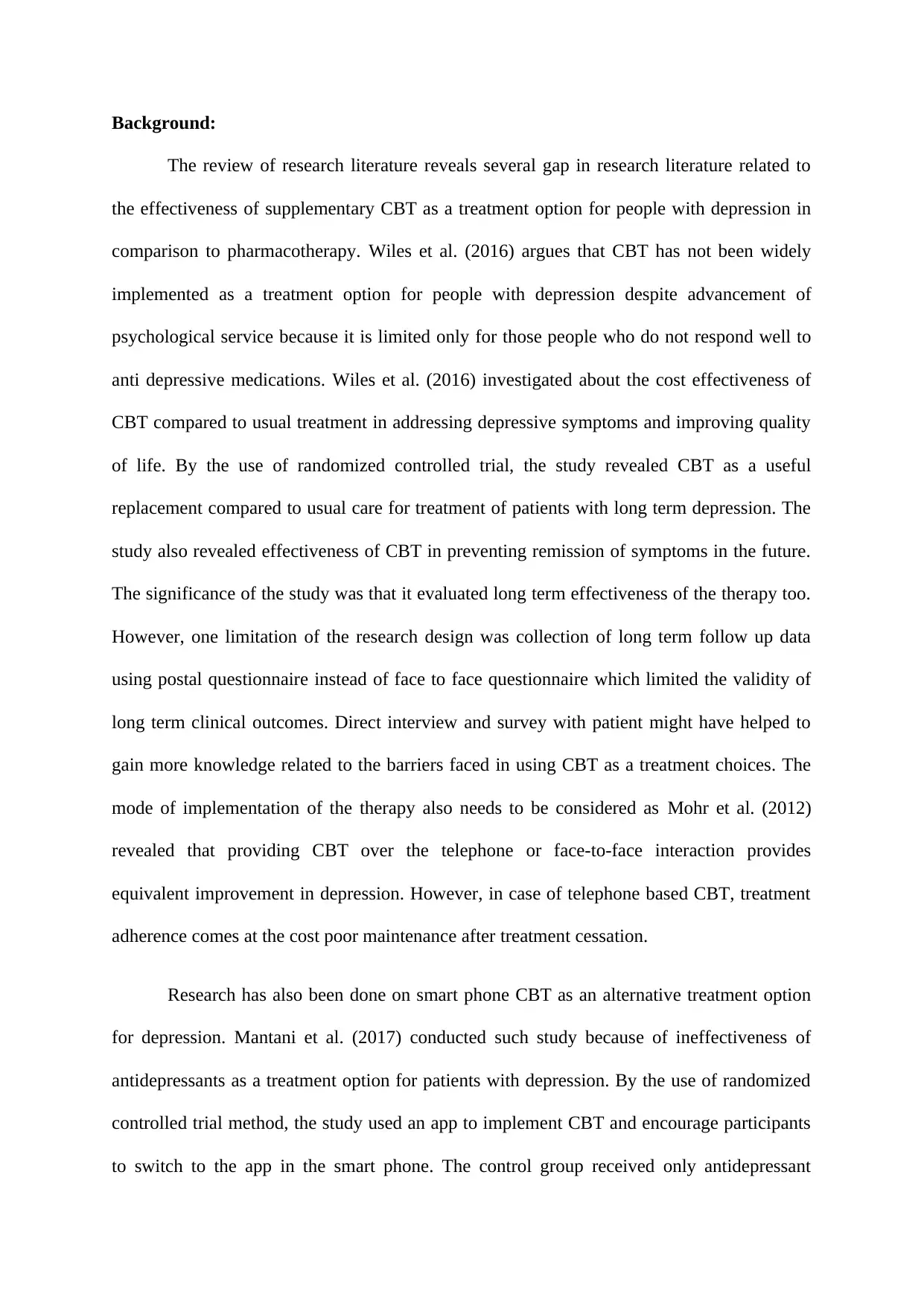
Background:
The review of research literature reveals several gap in research literature related to
the effectiveness of supplementary CBT as a treatment option for people with depression in
comparison to pharmacotherapy. Wiles et al. (2016) argues that CBT has not been widely
implemented as a treatment option for people with depression despite advancement of
psychological service because it is limited only for those people who do not respond well to
anti depressive medications. Wiles et al. (2016) investigated about the cost effectiveness of
CBT compared to usual treatment in addressing depressive symptoms and improving quality
of life. By the use of randomized controlled trial, the study revealed CBT as a useful
replacement compared to usual care for treatment of patients with long term depression. The
study also revealed effectiveness of CBT in preventing remission of symptoms in the future.
The significance of the study was that it evaluated long term effectiveness of the therapy too.
However, one limitation of the research design was collection of long term follow up data
using postal questionnaire instead of face to face questionnaire which limited the validity of
long term clinical outcomes. Direct interview and survey with patient might have helped to
gain more knowledge related to the barriers faced in using CBT as a treatment choices. The
mode of implementation of the therapy also needs to be considered as Mohr et al. (2012)
revealed that providing CBT over the telephone or face-to-face interaction provides
equivalent improvement in depression. However, in case of telephone based CBT, treatment
adherence comes at the cost poor maintenance after treatment cessation.
Research has also been done on smart phone CBT as an alternative treatment option
for depression. Mantani et al. (2017) conducted such study because of ineffectiveness of
antidepressants as a treatment option for patients with depression. By the use of randomized
controlled trial method, the study used an app to implement CBT and encourage participants
to switch to the app in the smart phone. The control group received only antidepressant
The review of research literature reveals several gap in research literature related to
the effectiveness of supplementary CBT as a treatment option for people with depression in
comparison to pharmacotherapy. Wiles et al. (2016) argues that CBT has not been widely
implemented as a treatment option for people with depression despite advancement of
psychological service because it is limited only for those people who do not respond well to
anti depressive medications. Wiles et al. (2016) investigated about the cost effectiveness of
CBT compared to usual treatment in addressing depressive symptoms and improving quality
of life. By the use of randomized controlled trial, the study revealed CBT as a useful
replacement compared to usual care for treatment of patients with long term depression. The
study also revealed effectiveness of CBT in preventing remission of symptoms in the future.
The significance of the study was that it evaluated long term effectiveness of the therapy too.
However, one limitation of the research design was collection of long term follow up data
using postal questionnaire instead of face to face questionnaire which limited the validity of
long term clinical outcomes. Direct interview and survey with patient might have helped to
gain more knowledge related to the barriers faced in using CBT as a treatment choices. The
mode of implementation of the therapy also needs to be considered as Mohr et al. (2012)
revealed that providing CBT over the telephone or face-to-face interaction provides
equivalent improvement in depression. However, in case of telephone based CBT, treatment
adherence comes at the cost poor maintenance after treatment cessation.
Research has also been done on smart phone CBT as an alternative treatment option
for depression. Mantani et al. (2017) conducted such study because of ineffectiveness of
antidepressants as a treatment option for patients with depression. By the use of randomized
controlled trial method, the study used an app to implement CBT and encourage participants
to switch to the app in the smart phone. The control group received only antidepressant
⊘ This is a preview!⊘
Do you want full access?
Subscribe today to unlock all pages.

Trusted by 1+ million students worldwide
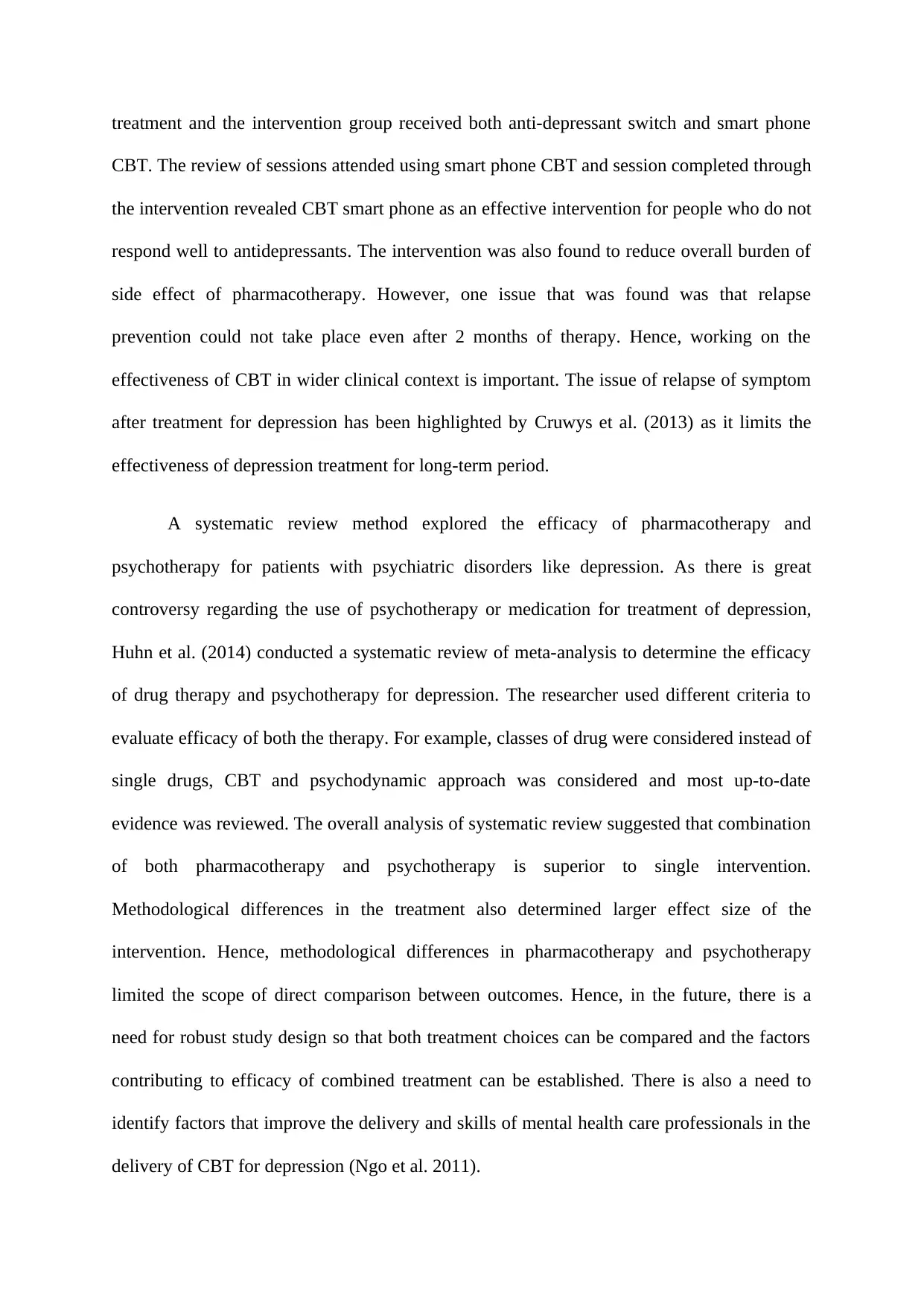
treatment and the intervention group received both anti-depressant switch and smart phone
CBT. The review of sessions attended using smart phone CBT and session completed through
the intervention revealed CBT smart phone as an effective intervention for people who do not
respond well to antidepressants. The intervention was also found to reduce overall burden of
side effect of pharmacotherapy. However, one issue that was found was that relapse
prevention could not take place even after 2 months of therapy. Hence, working on the
effectiveness of CBT in wider clinical context is important. The issue of relapse of symptom
after treatment for depression has been highlighted by Cruwys et al. (2013) as it limits the
effectiveness of depression treatment for long-term period.
A systematic review method explored the efficacy of pharmacotherapy and
psychotherapy for patients with psychiatric disorders like depression. As there is great
controversy regarding the use of psychotherapy or medication for treatment of depression,
Huhn et al. (2014) conducted a systematic review of meta-analysis to determine the efficacy
of drug therapy and psychotherapy for depression. The researcher used different criteria to
evaluate efficacy of both the therapy. For example, classes of drug were considered instead of
single drugs, CBT and psychodynamic approach was considered and most up-to-date
evidence was reviewed. The overall analysis of systematic review suggested that combination
of both pharmacotherapy and psychotherapy is superior to single intervention.
Methodological differences in the treatment also determined larger effect size of the
intervention. Hence, methodological differences in pharmacotherapy and psychotherapy
limited the scope of direct comparison between outcomes. Hence, in the future, there is a
need for robust study design so that both treatment choices can be compared and the factors
contributing to efficacy of combined treatment can be established. There is also a need to
identify factors that improve the delivery and skills of mental health care professionals in the
delivery of CBT for depression (Ngo et al. 2011).
CBT. The review of sessions attended using smart phone CBT and session completed through
the intervention revealed CBT smart phone as an effective intervention for people who do not
respond well to antidepressants. The intervention was also found to reduce overall burden of
side effect of pharmacotherapy. However, one issue that was found was that relapse
prevention could not take place even after 2 months of therapy. Hence, working on the
effectiveness of CBT in wider clinical context is important. The issue of relapse of symptom
after treatment for depression has been highlighted by Cruwys et al. (2013) as it limits the
effectiveness of depression treatment for long-term period.
A systematic review method explored the efficacy of pharmacotherapy and
psychotherapy for patients with psychiatric disorders like depression. As there is great
controversy regarding the use of psychotherapy or medication for treatment of depression,
Huhn et al. (2014) conducted a systematic review of meta-analysis to determine the efficacy
of drug therapy and psychotherapy for depression. The researcher used different criteria to
evaluate efficacy of both the therapy. For example, classes of drug were considered instead of
single drugs, CBT and psychodynamic approach was considered and most up-to-date
evidence was reviewed. The overall analysis of systematic review suggested that combination
of both pharmacotherapy and psychotherapy is superior to single intervention.
Methodological differences in the treatment also determined larger effect size of the
intervention. Hence, methodological differences in pharmacotherapy and psychotherapy
limited the scope of direct comparison between outcomes. Hence, in the future, there is a
need for robust study design so that both treatment choices can be compared and the factors
contributing to efficacy of combined treatment can be established. There is also a need to
identify factors that improve the delivery and skills of mental health care professionals in the
delivery of CBT for depression (Ngo et al. 2011).
Paraphrase This Document
Need a fresh take? Get an instant paraphrase of this document with our AI Paraphraser
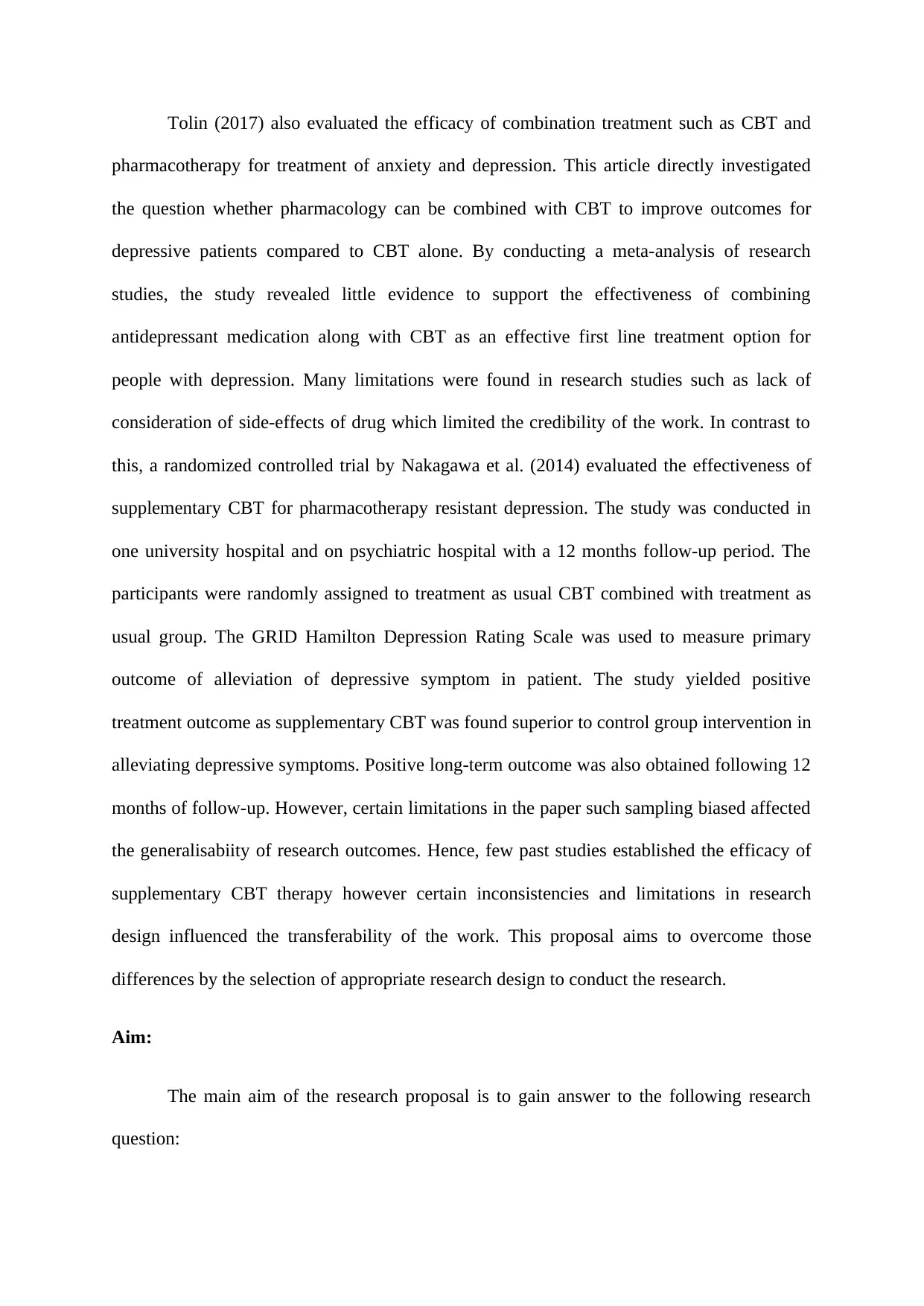
Tolin (2017) also evaluated the efficacy of combination treatment such as CBT and
pharmacotherapy for treatment of anxiety and depression. This article directly investigated
the question whether pharmacology can be combined with CBT to improve outcomes for
depressive patients compared to CBT alone. By conducting a meta-analysis of research
studies, the study revealed little evidence to support the effectiveness of combining
antidepressant medication along with CBT as an effective first line treatment option for
people with depression. Many limitations were found in research studies such as lack of
consideration of side-effects of drug which limited the credibility of the work. In contrast to
this, a randomized controlled trial by Nakagawa et al. (2014) evaluated the effectiveness of
supplementary CBT for pharmacotherapy resistant depression. The study was conducted in
one university hospital and on psychiatric hospital with a 12 months follow-up period. The
participants were randomly assigned to treatment as usual CBT combined with treatment as
usual group. The GRID Hamilton Depression Rating Scale was used to measure primary
outcome of alleviation of depressive symptom in patient. The study yielded positive
treatment outcome as supplementary CBT was found superior to control group intervention in
alleviating depressive symptoms. Positive long-term outcome was also obtained following 12
months of follow-up. However, certain limitations in the paper such sampling biased affected
the generalisabiity of research outcomes. Hence, few past studies established the efficacy of
supplementary CBT therapy however certain inconsistencies and limitations in research
design influenced the transferability of the work. This proposal aims to overcome those
differences by the selection of appropriate research design to conduct the research.
Aim:
The main aim of the research proposal is to gain answer to the following research
question:
pharmacotherapy for treatment of anxiety and depression. This article directly investigated
the question whether pharmacology can be combined with CBT to improve outcomes for
depressive patients compared to CBT alone. By conducting a meta-analysis of research
studies, the study revealed little evidence to support the effectiveness of combining
antidepressant medication along with CBT as an effective first line treatment option for
people with depression. Many limitations were found in research studies such as lack of
consideration of side-effects of drug which limited the credibility of the work. In contrast to
this, a randomized controlled trial by Nakagawa et al. (2014) evaluated the effectiveness of
supplementary CBT for pharmacotherapy resistant depression. The study was conducted in
one university hospital and on psychiatric hospital with a 12 months follow-up period. The
participants were randomly assigned to treatment as usual CBT combined with treatment as
usual group. The GRID Hamilton Depression Rating Scale was used to measure primary
outcome of alleviation of depressive symptom in patient. The study yielded positive
treatment outcome as supplementary CBT was found superior to control group intervention in
alleviating depressive symptoms. Positive long-term outcome was also obtained following 12
months of follow-up. However, certain limitations in the paper such sampling biased affected
the generalisabiity of research outcomes. Hence, few past studies established the efficacy of
supplementary CBT therapy however certain inconsistencies and limitations in research
design influenced the transferability of the work. This proposal aims to overcome those
differences by the selection of appropriate research design to conduct the research.
Aim:
The main aim of the research proposal is to gain answer to the following research
question:
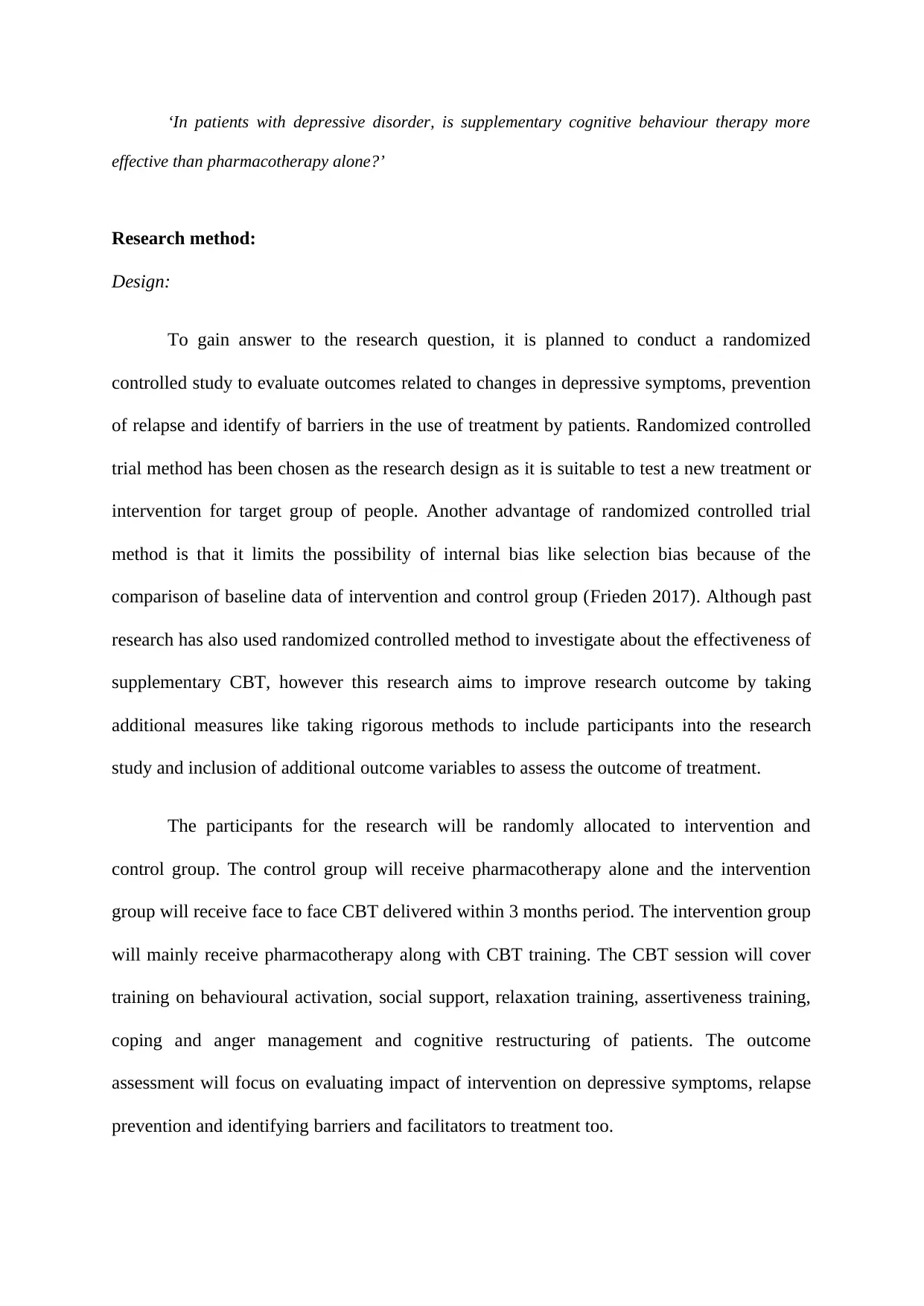
‘In patients with depressive disorder, is supplementary cognitive behaviour therapy more
effective than pharmacotherapy alone?’
Research method:
Design:
To gain answer to the research question, it is planned to conduct a randomized
controlled study to evaluate outcomes related to changes in depressive symptoms, prevention
of relapse and identify of barriers in the use of treatment by patients. Randomized controlled
trial method has been chosen as the research design as it is suitable to test a new treatment or
intervention for target group of people. Another advantage of randomized controlled trial
method is that it limits the possibility of internal bias like selection bias because of the
comparison of baseline data of intervention and control group (Frieden 2017). Although past
research has also used randomized controlled method to investigate about the effectiveness of
supplementary CBT, however this research aims to improve research outcome by taking
additional measures like taking rigorous methods to include participants into the research
study and inclusion of additional outcome variables to assess the outcome of treatment.
The participants for the research will be randomly allocated to intervention and
control group. The control group will receive pharmacotherapy alone and the intervention
group will receive face to face CBT delivered within 3 months period. The intervention group
will mainly receive pharmacotherapy along with CBT training. The CBT session will cover
training on behavioural activation, social support, relaxation training, assertiveness training,
coping and anger management and cognitive restructuring of patients. The outcome
assessment will focus on evaluating impact of intervention on depressive symptoms, relapse
prevention and identifying barriers and facilitators to treatment too.
effective than pharmacotherapy alone?’
Research method:
Design:
To gain answer to the research question, it is planned to conduct a randomized
controlled study to evaluate outcomes related to changes in depressive symptoms, prevention
of relapse and identify of barriers in the use of treatment by patients. Randomized controlled
trial method has been chosen as the research design as it is suitable to test a new treatment or
intervention for target group of people. Another advantage of randomized controlled trial
method is that it limits the possibility of internal bias like selection bias because of the
comparison of baseline data of intervention and control group (Frieden 2017). Although past
research has also used randomized controlled method to investigate about the effectiveness of
supplementary CBT, however this research aims to improve research outcome by taking
additional measures like taking rigorous methods to include participants into the research
study and inclusion of additional outcome variables to assess the outcome of treatment.
The participants for the research will be randomly allocated to intervention and
control group. The control group will receive pharmacotherapy alone and the intervention
group will receive face to face CBT delivered within 3 months period. The intervention group
will mainly receive pharmacotherapy along with CBT training. The CBT session will cover
training on behavioural activation, social support, relaxation training, assertiveness training,
coping and anger management and cognitive restructuring of patients. The outcome
assessment will focus on evaluating impact of intervention on depressive symptoms, relapse
prevention and identifying barriers and facilitators to treatment too.
⊘ This is a preview!⊘
Do you want full access?
Subscribe today to unlock all pages.

Trusted by 1+ million students worldwide
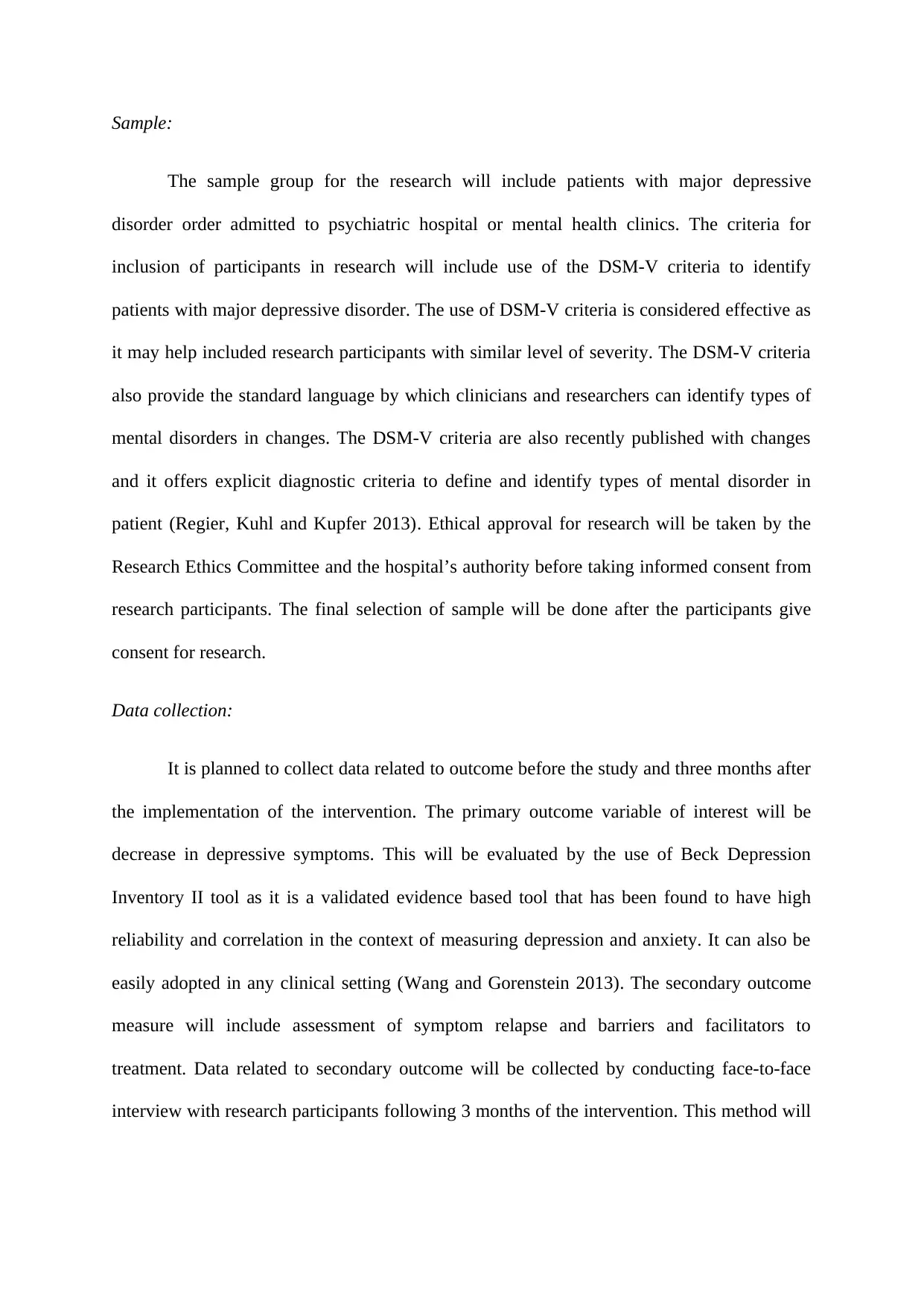
Sample:
The sample group for the research will include patients with major depressive
disorder order admitted to psychiatric hospital or mental health clinics. The criteria for
inclusion of participants in research will include use of the DSM-V criteria to identify
patients with major depressive disorder. The use of DSM-V criteria is considered effective as
it may help included research participants with similar level of severity. The DSM-V criteria
also provide the standard language by which clinicians and researchers can identify types of
mental disorders in changes. The DSM-V criteria are also recently published with changes
and it offers explicit diagnostic criteria to define and identify types of mental disorder in
patient (Regier, Kuhl and Kupfer 2013). Ethical approval for research will be taken by the
Research Ethics Committee and the hospital’s authority before taking informed consent from
research participants. The final selection of sample will be done after the participants give
consent for research.
Data collection:
It is planned to collect data related to outcome before the study and three months after
the implementation of the intervention. The primary outcome variable of interest will be
decrease in depressive symptoms. This will be evaluated by the use of Beck Depression
Inventory II tool as it is a validated evidence based tool that has been found to have high
reliability and correlation in the context of measuring depression and anxiety. It can also be
easily adopted in any clinical setting (Wang and Gorenstein 2013). The secondary outcome
measure will include assessment of symptom relapse and barriers and facilitators to
treatment. Data related to secondary outcome will be collected by conducting face-to-face
interview with research participants following 3 months of the intervention. This method will
The sample group for the research will include patients with major depressive
disorder order admitted to psychiatric hospital or mental health clinics. The criteria for
inclusion of participants in research will include use of the DSM-V criteria to identify
patients with major depressive disorder. The use of DSM-V criteria is considered effective as
it may help included research participants with similar level of severity. The DSM-V criteria
also provide the standard language by which clinicians and researchers can identify types of
mental disorders in changes. The DSM-V criteria are also recently published with changes
and it offers explicit diagnostic criteria to define and identify types of mental disorder in
patient (Regier, Kuhl and Kupfer 2013). Ethical approval for research will be taken by the
Research Ethics Committee and the hospital’s authority before taking informed consent from
research participants. The final selection of sample will be done after the participants give
consent for research.
Data collection:
It is planned to collect data related to outcome before the study and three months after
the implementation of the intervention. The primary outcome variable of interest will be
decrease in depressive symptoms. This will be evaluated by the use of Beck Depression
Inventory II tool as it is a validated evidence based tool that has been found to have high
reliability and correlation in the context of measuring depression and anxiety. It can also be
easily adopted in any clinical setting (Wang and Gorenstein 2013). The secondary outcome
measure will include assessment of symptom relapse and barriers and facilitators to
treatment. Data related to secondary outcome will be collected by conducting face-to-face
interview with research participants following 3 months of the intervention. This method will
Paraphrase This Document
Need a fresh take? Get an instant paraphrase of this document with our AI Paraphraser

help to evaluate the efficacy of the intervention in terms of reduction in depressive
symptoms, acceptance of treatment and symptom relapse status.
symptoms, acceptance of treatment and symptom relapse status.
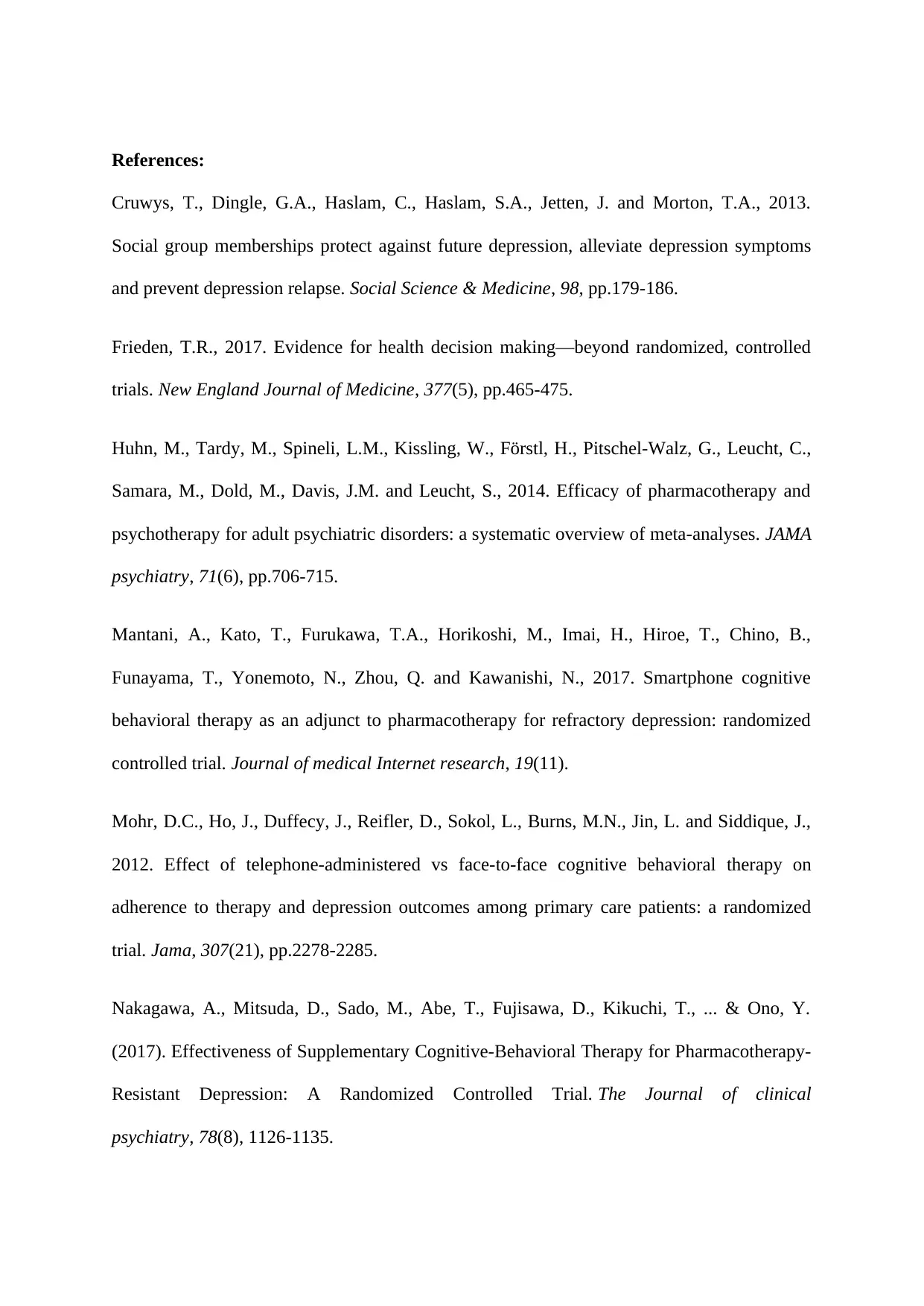
References:
Cruwys, T., Dingle, G.A., Haslam, C., Haslam, S.A., Jetten, J. and Morton, T.A., 2013.
Social group memberships protect against future depression, alleviate depression symptoms
and prevent depression relapse. Social Science & Medicine, 98, pp.179-186.
Frieden, T.R., 2017. Evidence for health decision making—beyond randomized, controlled
trials. New England Journal of Medicine, 377(5), pp.465-475.
Huhn, M., Tardy, M., Spineli, L.M., Kissling, W., Förstl, H., Pitschel-Walz, G., Leucht, C.,
Samara, M., Dold, M., Davis, J.M. and Leucht, S., 2014. Efficacy of pharmacotherapy and
psychotherapy for adult psychiatric disorders: a systematic overview of meta-analyses. JAMA
psychiatry, 71(6), pp.706-715.
Mantani, A., Kato, T., Furukawa, T.A., Horikoshi, M., Imai, H., Hiroe, T., Chino, B.,
Funayama, T., Yonemoto, N., Zhou, Q. and Kawanishi, N., 2017. Smartphone cognitive
behavioral therapy as an adjunct to pharmacotherapy for refractory depression: randomized
controlled trial. Journal of medical Internet research, 19(11).
Mohr, D.C., Ho, J., Duffecy, J., Reifler, D., Sokol, L., Burns, M.N., Jin, L. and Siddique, J.,
2012. Effect of telephone-administered vs face-to-face cognitive behavioral therapy on
adherence to therapy and depression outcomes among primary care patients: a randomized
trial. Jama, 307(21), pp.2278-2285.
Nakagawa, A., Mitsuda, D., Sado, M., Abe, T., Fujisawa, D., Kikuchi, T., ... & Ono, Y.
(2017). Effectiveness of Supplementary Cognitive-Behavioral Therapy for Pharmacotherapy-
Resistant Depression: A Randomized Controlled Trial. The Journal of clinical
psychiatry, 78(8), 1126-1135.
Cruwys, T., Dingle, G.A., Haslam, C., Haslam, S.A., Jetten, J. and Morton, T.A., 2013.
Social group memberships protect against future depression, alleviate depression symptoms
and prevent depression relapse. Social Science & Medicine, 98, pp.179-186.
Frieden, T.R., 2017. Evidence for health decision making—beyond randomized, controlled
trials. New England Journal of Medicine, 377(5), pp.465-475.
Huhn, M., Tardy, M., Spineli, L.M., Kissling, W., Förstl, H., Pitschel-Walz, G., Leucht, C.,
Samara, M., Dold, M., Davis, J.M. and Leucht, S., 2014. Efficacy of pharmacotherapy and
psychotherapy for adult psychiatric disorders: a systematic overview of meta-analyses. JAMA
psychiatry, 71(6), pp.706-715.
Mantani, A., Kato, T., Furukawa, T.A., Horikoshi, M., Imai, H., Hiroe, T., Chino, B.,
Funayama, T., Yonemoto, N., Zhou, Q. and Kawanishi, N., 2017. Smartphone cognitive
behavioral therapy as an adjunct to pharmacotherapy for refractory depression: randomized
controlled trial. Journal of medical Internet research, 19(11).
Mohr, D.C., Ho, J., Duffecy, J., Reifler, D., Sokol, L., Burns, M.N., Jin, L. and Siddique, J.,
2012. Effect of telephone-administered vs face-to-face cognitive behavioral therapy on
adherence to therapy and depression outcomes among primary care patients: a randomized
trial. Jama, 307(21), pp.2278-2285.
Nakagawa, A., Mitsuda, D., Sado, M., Abe, T., Fujisawa, D., Kikuchi, T., ... & Ono, Y.
(2017). Effectiveness of Supplementary Cognitive-Behavioral Therapy for Pharmacotherapy-
Resistant Depression: A Randomized Controlled Trial. The Journal of clinical
psychiatry, 78(8), 1126-1135.
⊘ This is a preview!⊘
Do you want full access?
Subscribe today to unlock all pages.

Trusted by 1+ million students worldwide
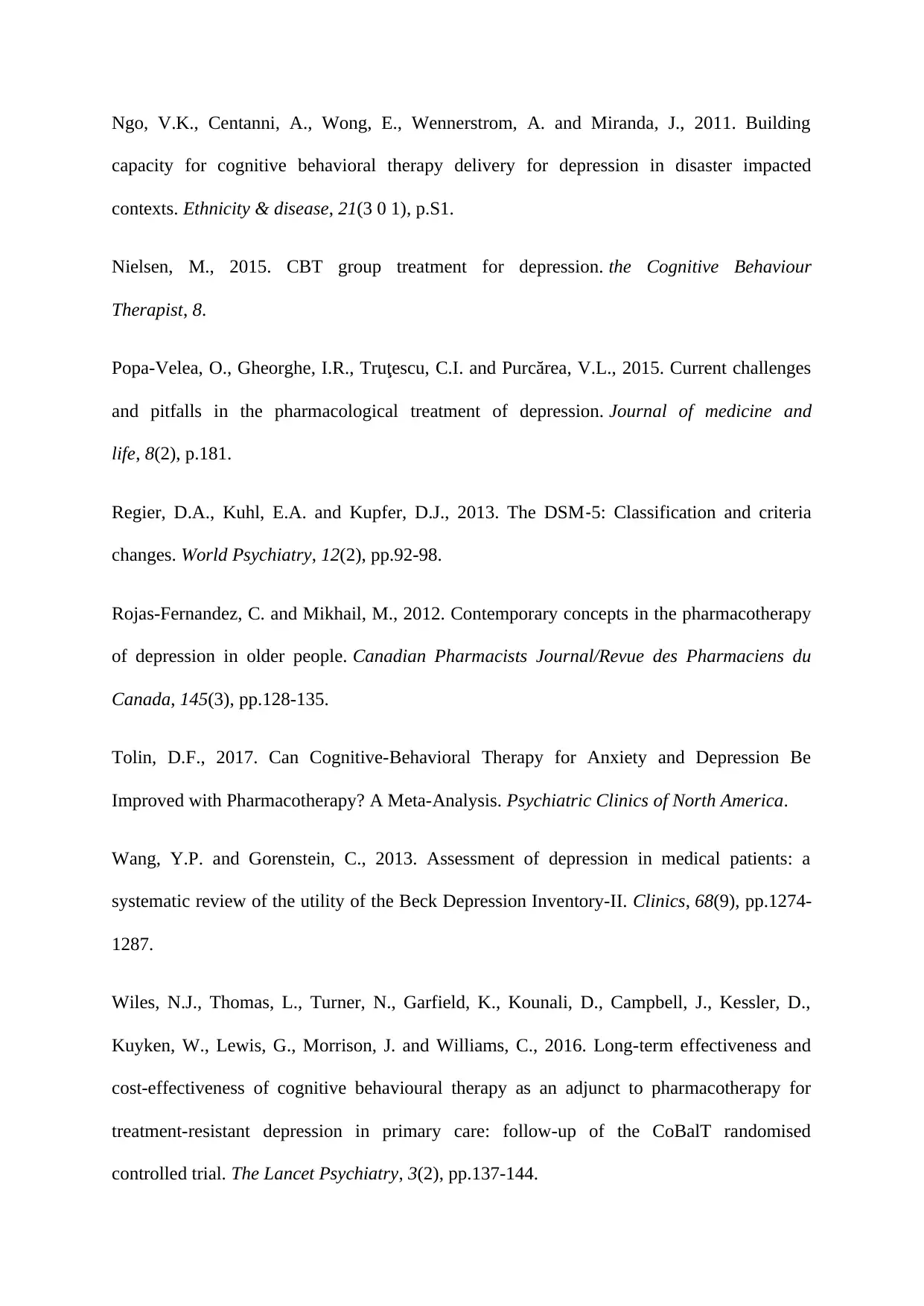
Ngo, V.K., Centanni, A., Wong, E., Wennerstrom, A. and Miranda, J., 2011. Building
capacity for cognitive behavioral therapy delivery for depression in disaster impacted
contexts. Ethnicity & disease, 21(3 0 1), p.S1.
Nielsen, M., 2015. CBT group treatment for depression. the Cognitive Behaviour
Therapist, 8.
Popa-Velea, O., Gheorghe, I.R., Truţescu, C.I. and Purcărea, V.L., 2015. Current challenges
and pitfalls in the pharmacological treatment of depression. Journal of medicine and
life, 8(2), p.181.
Regier, D.A., Kuhl, E.A. and Kupfer, D.J., 2013. The DSM‐5: Classification and criteria
changes. World Psychiatry, 12(2), pp.92-98.
Rojas-Fernandez, C. and Mikhail, M., 2012. Contemporary concepts in the pharmacotherapy
of depression in older people. Canadian Pharmacists Journal/Revue des Pharmaciens du
Canada, 145(3), pp.128-135.
Tolin, D.F., 2017. Can Cognitive-Behavioral Therapy for Anxiety and Depression Be
Improved with Pharmacotherapy? A Meta-Analysis. Psychiatric Clinics of North America.
Wang, Y.P. and Gorenstein, C., 2013. Assessment of depression in medical patients: a
systematic review of the utility of the Beck Depression Inventory-II. Clinics, 68(9), pp.1274-
1287.
Wiles, N.J., Thomas, L., Turner, N., Garfield, K., Kounali, D., Campbell, J., Kessler, D.,
Kuyken, W., Lewis, G., Morrison, J. and Williams, C., 2016. Long-term effectiveness and
cost-effectiveness of cognitive behavioural therapy as an adjunct to pharmacotherapy for
treatment-resistant depression in primary care: follow-up of the CoBalT randomised
controlled trial. The Lancet Psychiatry, 3(2), pp.137-144.
capacity for cognitive behavioral therapy delivery for depression in disaster impacted
contexts. Ethnicity & disease, 21(3 0 1), p.S1.
Nielsen, M., 2015. CBT group treatment for depression. the Cognitive Behaviour
Therapist, 8.
Popa-Velea, O., Gheorghe, I.R., Truţescu, C.I. and Purcărea, V.L., 2015. Current challenges
and pitfalls in the pharmacological treatment of depression. Journal of medicine and
life, 8(2), p.181.
Regier, D.A., Kuhl, E.A. and Kupfer, D.J., 2013. The DSM‐5: Classification and criteria
changes. World Psychiatry, 12(2), pp.92-98.
Rojas-Fernandez, C. and Mikhail, M., 2012. Contemporary concepts in the pharmacotherapy
of depression in older people. Canadian Pharmacists Journal/Revue des Pharmaciens du
Canada, 145(3), pp.128-135.
Tolin, D.F., 2017. Can Cognitive-Behavioral Therapy for Anxiety and Depression Be
Improved with Pharmacotherapy? A Meta-Analysis. Psychiatric Clinics of North America.
Wang, Y.P. and Gorenstein, C., 2013. Assessment of depression in medical patients: a
systematic review of the utility of the Beck Depression Inventory-II. Clinics, 68(9), pp.1274-
1287.
Wiles, N.J., Thomas, L., Turner, N., Garfield, K., Kounali, D., Campbell, J., Kessler, D.,
Kuyken, W., Lewis, G., Morrison, J. and Williams, C., 2016. Long-term effectiveness and
cost-effectiveness of cognitive behavioural therapy as an adjunct to pharmacotherapy for
treatment-resistant depression in primary care: follow-up of the CoBalT randomised
controlled trial. The Lancet Psychiatry, 3(2), pp.137-144.
1 out of 10
Related Documents
Your All-in-One AI-Powered Toolkit for Academic Success.
+13062052269
info@desklib.com
Available 24*7 on WhatsApp / Email
![[object Object]](/_next/static/media/star-bottom.7253800d.svg)
Unlock your academic potential
Copyright © 2020–2026 A2Z Services. All Rights Reserved. Developed and managed by ZUCOL.




